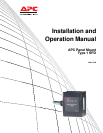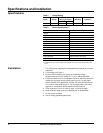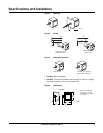
Installation and Operation Manual 5
Introduction
Thank you for choosing the APC SurgeArrest
®
PMP1XR-B Surge Protective Device (SPD).
The APC Surge Protective Device (SPD) is a high-quality, high-energy surge attenuation system that has been designed to protect
sensitive equipment from damaging transient voltage surges. Proper installation is imperative to maximize the surge suppressor’s
effectiveness and performance.
This manual is to be used as a guide for installing the device. Read and understand all information contained in this manual prior to
installation. The outlined procedures are not intended to supersede local or national electrical codes. Check all applicable electrical
codes to assure compliance.
This device must be installed by qualified electrical personnel. The installer should follow the steps detailed in this manual to
ensure proper installation. A copy of the installer’s invoice, detailing the installation of this device, is required in order to take
advantage of the unit’s product warranty.
The SurgeArrest
®
PMP1XR-B product lines specify a parallel SPD designed for service entrance and downstream panelboard
applications. These units provide a maximum surge protection rating of 50 kA per phase rating.
All APC products are extensively tested according to industry standards as set by IEEE C62.41 and C62.45 for Categories A, B, and
C. The connection method for these devices may require several feet of wire. Be aware that increased lead length adversely affects
clamping voltages.
Save this manual! It includes instructions regarding the product warranty and replacement parts.
Testing
Any factory or on-site testing that exceeds the normal operating voltage, such as high-potential insulation testing or other tests where
the suppression components will be subjected to voltages higher than their rated “turn on” voltage, must be run with the suppressor
disconnected from the power source. For four-wire devices, the neutral connection at the SPD must also be disconnected prior to
performing high-potential testing and then reconnected upon completion of the test.
Failure to disconnect this surge suppression device and its associated suppression components during elevated voltage testing will
result in damage to the suppression components and/or other electronic components.
Introduction










